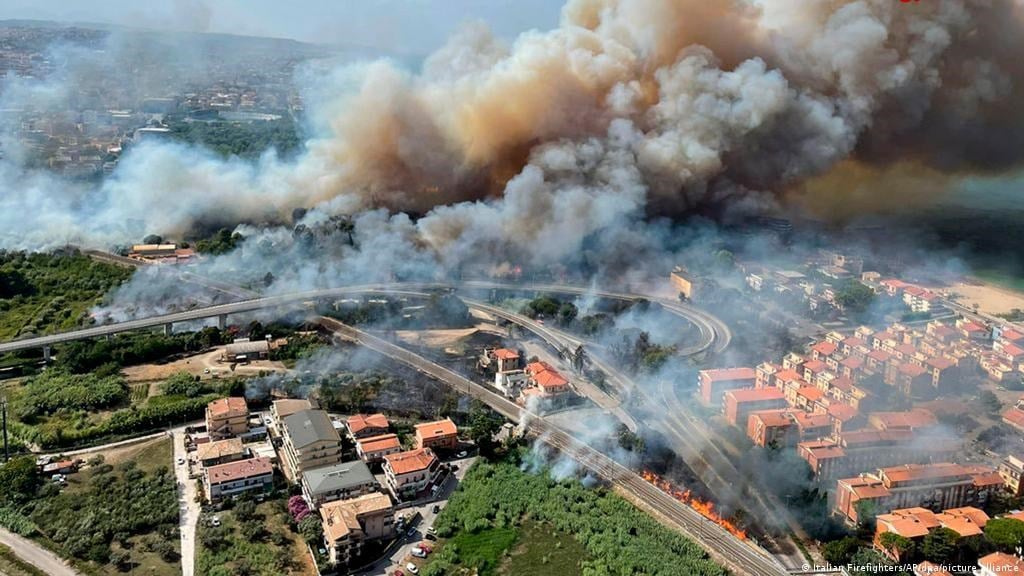Europe's 2021 summer was the hottest ever recorded
The European Union's Copernicus climate change agency revealed that 2021 was Europe's hottest summer, with temperatures 1°C higher than the 1991-2020 average.
-

Europe witnessed the hottest summer in 2021.
Research released on Friday by the European Union's Copernicus climate change agency revealed that Europe endured its hottest summer on record in 2021, while being ravaged by floods, heatwaves, and fires, indicating that global warming is rapidly increasing.
The European Union's climate change agency delivered another frightening result less than three weeks after the release of the latest IPCC report, which warned that the world's temperature is on track to surpass the threshold of 1.5oC over pre-industrial levels within the next two decades.
According to EU experts, Europe had the warmest summer on record in 2021, with temperatures 1°C higher than the 1991-2020 average.
Read more: Europe to Miss 2030 Climate Objective by 21 Years
Although 2021 was not the hottest year on record in Europe or the world, "the summer was characterized by record temperatures, intense and long-lasting heatwaves, and extreme floods," according to the European Climate Change Service's annual report released on Earth Day.
The summer heatwave was especially severe in southern Europe, with "many temperature records," according to the report. Temperatures in northern Spain reached 47°C, a "national record," and in Italy, 48.8°C in Sicily, a "European record." "The heatwave lasted two to three weeks in some parts of Italy, Greece, and Turkey," the experts stated.
The high temperatures caused a drought in these three countries. Forest fires erupted as vegetation became more flammable in the warmer air, wreaking havoc. According to Copernicus, fires devastated more than 800,000 hectares in the Mediterranean region in July and August.
The illusion of a cooler spring
However, the spring of 2021 was significantly colder than usual, which sounded encouraging at first. The spring was "one of the coldest in the last ten years," according to Copernicus, with temperatures up to 2°C below average.
But there can be no doubt about it: "In general, all seasons in Europe have warmed significantly during the last few decades. We had a fairly mild spring and summer in 2020, but the autumn and winter were the warmest on record, whereas in 2021, the spring was cooler than usual and the summer was the warmest on record "Copernicus spoke to France24.
Furthermore, average temperatures in the spring of 2021 were greater than before 1980. Global warming began to accelerate dramatically around 1970-1980.
Climate change has not spared European oceans, particularly the Baltic, where scientists discovered that in June and July, certain areas were "more than 5°C above average." The overall year-end results also set new highs. Temperatures in wide regions of the Baltic Sea and the eastern Mediterranean have not been this high since at least 1993, according to Copernicus scientists.
Devastating floods
The exceptionally warm Baltic Sea appears to have been the cause of the July floods in Germany and Belgium. "It has resulted in higher humidity, which in turn has fed low atmospheric pressure," Copernicus stated to France24. "This is conducive to the production of wind, rain, and clouds."
Furthermore, "the relatively low speed of the disturbance" is most likely another cause of the severe rainfall, according to the European agency. The water then piled in the Meuse and Rhine rivers, while the land was already saturated and could no longer absorb the rain, resulting in the floods that devastated several Western European countries.
At the same time, on a global scale, "carbon dioxide (CO2) and methane (CH4) concentrations have continued to increase [in 2021, with a] particularly large increase" in methane concentration.
The rise in greenhouse gases in the atmosphere, including CO2 and methane, is what is generating global warming. These greenhouse gases absorb more of the Sun's rays than is necessary, raising Earth's temperature.
This phenomenon was felt all year in Europe, not just during the summer. The research stated that "globally, 2021 was the sixth or seventh warmest year since at least 1850," and that "the last seven years have been the warmest on record."
According to Copernicus, the European continent has warmed by around 2°C since pre-industrial times, and the world has warmed by 1.1°C to 1.2°C. The IPCC, for its part, is urging immediate action to keep global warming below 1.5°C - a critical threshold that must not be exceeded if the Earth is to stay habitable.

 4 Min Read
4 Min Read









